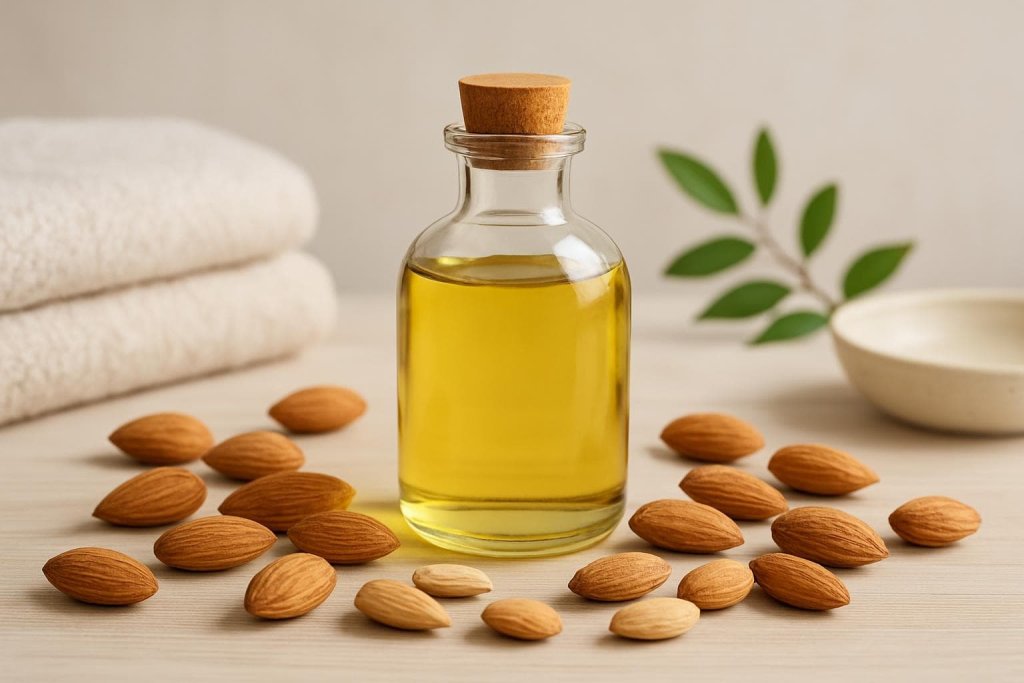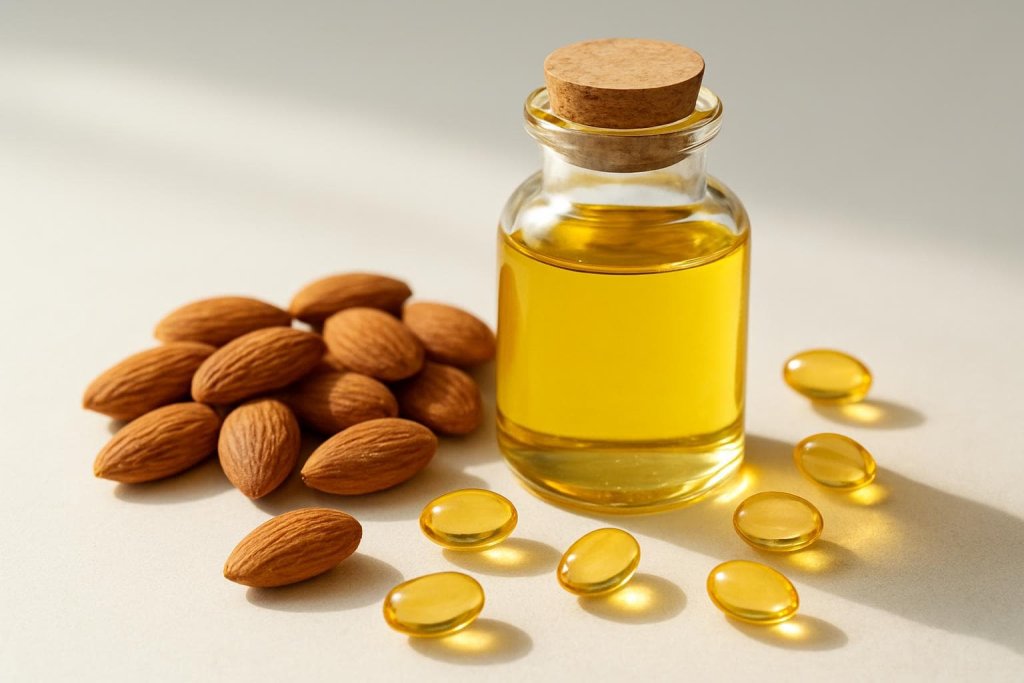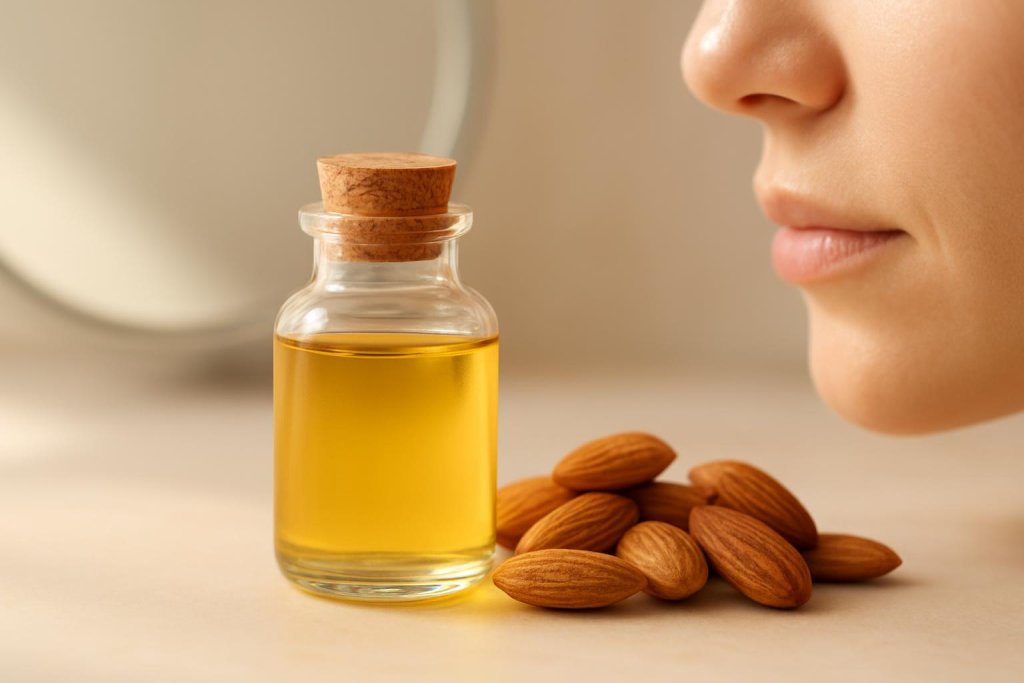Almond oil offers several science-backed benefits for skin, hair, and wellness, and it may support heart health, hydration, and antioxidant protection when used properly. This oil is rich in vitamin E and healthy fats, making it a popular choice for cooking and personal care.

Understanding the benefits and the safety precautions is important because almond oil is a tree-nut product, and certain groups need to use it carefully. This guide explains how almond oil works, the proven benefits, safe ways to use it, and who should avoid it.
What Is Almond Oil? (Overview and Nutrition Profile)
Almond oil is a plant-based oil extracted from the seeds of the sweet almond tree (Prunus amygdalus dulcis) and is valued for its nutrient-rich profile and versatile uses in cooking and skincare. It is naturally high in vitamin E and healthy fats, which support skin hydration and overall wellness when used appropriately.
Almond oil is available in two primary forms:
Sweet Almond Oil (Most Common and Safe for Skin/Cooking)
Sweet almond oil is made from edible almonds and is widely used for skincare, hair care, and culinary applications. It is considered safe for topical use in individuals without nut allergies and is commonly included in moisturizers and massage oils.
Bitter Almond Oil (Not for General Use)
Bitter almond oil comes from a different almond variety and naturally contains compounds that must be processed to remove toxic components. It is not appropriate for cooking or routine skincare. Most safety authorities recommend choosing sweet almond oil for household use.
Nutrition Profile of Almond Oil
According to USDA FoodData Central, almond oil is almost entirely composed of fats, providing concentrated energy and essential fatty acids. Its key nutrients include:
Healthy Fats
- Monounsaturated fats (about 70%) – These fats may support healthy cholesterol balance when used in place of higher-saturated-fat oils.
- Polyunsaturated fats (about 17%) – Provide essential fatty acids important for cell integrity.
- Saturated fats (about 8%) – Present in small amounts compared to other oils.
Vitamin E
Almond oil is rich in vitamin E (alpha-tocopherol), an antioxidant that supports skin and cellular protection from oxidative stress. This nutrient density contributes to many of almond oil’s skin-conditioning and wellness-related qualities.
Calorie Density
Because almond oil is a pure fat source, one tablespoon contains around 120 calories. Moderation is important, especially for individuals monitoring calorie intake.
12 Science-Backed Benefits of Almond Oil (And How to Use It Safely)
Almond oil offers a wide range of science-supported benefits for skin, hair, and wellness. Below are the most evidence-based advantages, explained in a safe, factual, research-backed way.
1. Supports Heart Health

Almond oil contains predominantly monounsaturated fats, similar to the heart-friendly profile found in olive oil. Replacing saturated fats with almond oil may help support healthier lipid levels, including improvements in LDL and non-HDL cholesterol.
Human trials on almond intake, such as those published in the Nutrients Journal, show favorable changes in cholesterol markers when nuts or nut-derived fats are included as part of a balanced diet.
See research summary in the Nutrients journal: Almond Intake & Cardiometabolic Health.
2. May Help Reduce Oxidative Stress

Almond oil is naturally rich in vitamin E (alpha-tocopherol), a fat-soluble antioxidant known to help protect cells from oxidative damage. Including vitamin-E-rich oils in the diet may support the body’s ability to manage free radical exposure and maintain balanced inflammatory responses.
For nutrient data, see the USDA FoodData Central entry on almond oil.
3. Supports Skin Barrier Hydration

Sweet almond oil functions as an emollient and occlusive, meaning it helps soften the skin and reduce moisture loss. Dermatology literature notes that almond oil supports the skin barrier, especially in individuals dealing with dryness, flakiness, or environmental irritation.
To understand how nut oils interact with sensitive skin, see the National Eczema Association’s overview on oils and eczema.
4. May Reduce the Appearance of Fine Lines (When Consumed as Almonds)

Though the strongest clinical evidence comes from studies on whole almonds rather than almond oil alone, specific trials have shown that almond consumption may help reduce the appearance of wrinkles and uneven pigmentation in certain populations.
Because almond oil contains similar vitamin E and fatty acids, it’s commonly included in cosmetic formulations designed to support smoother, more nourished skin.
5. Helps Soften Dry or Brittle Hair

As a lightweight emollient, almond oil spreads easily through the hair shaft and may help improve softness, shine, and manageability. It’s frequently used as a finishing oil to reduce the appearance of dry or frizzy ends.
While not a regrowth treatment, it supports the cosmetic condition of the hair.
6. May Help Soothe Dry Scalp
Almond oil’s moisturizing properties may help reduce visible dryness and flakiness on the scalp. Applying a small amount to the scalp before washing can support comfort and hydration, particularly for individuals with seasonal dryness or tightness.
7. Supports Gentle Makeup Removal
Sweet almond oil dissolves sunscreen, foundation, and eye makeup while remaining gentle on most skin types. It’s often used in the first step of double-cleansing routines or in cleansing balms.
Because it’s a stable, mild oil, it helps remove debris without stripping the skin barrier.
8. May Support Skin Comfort in Certain Clinical Conditions
Emerging clinical observations suggest almond oil may help support skin comfort in specific situations.
For example, research reported on PubMed describes improvements in dryness and itch in individuals with uremic pruritus when almond oil is applied under professional guidance.
While not a treatment, almond oil can offer supportive hydration for certain skin discomforts.
9. May Increase Skin Smoothness
Almond oil’s fatty acids help soften rough patches on areas like elbows, knees, heels, and hands. Regular use may help improve overall texture, making the skin feel smoother and more conditioned.
10. Works as a Massage Oil

Sweet almond oil is a popular choice for massage because it has:
- Balanced absorbency
- A light, non-greasy feel
- Low scent
- Good glide
For individuals without nut allergies, it provides a comfortable base oil that supports relaxed, smooth massage movements.
11. Supports Healthy Cooking Swaps
Refined almond oil has a high smoke point and a mild flavor, making it useful for medium-heat sautéing.
When used instead of butter or high-saturated-fat ingredients, almond oil may support heart-friendly dietary patterns.
Nutrient profile available through the USDA FoodData Central database.
12. Rich in Vitamin E for Overall Wellness
Just one tablespoon of almond oil contains a concentrated amount of vitamin E, which supports immune function, cell protection, and skin health.
This makes almond oil a nutrient-dense option for both culinary and topical uses, as long as serving sizes are moderated due to its high calorie content.
Possible Side Effects and Precautions
Allergy and Sensitivity Risks
Almond oil comes from tree nuts, and individuals with almond or tree-nut allergies should avoid using it unless cleared by an allergist.
The American Academy of Allergy, Asthma & Immunology (AAAAI) explains that highly refined nut oils contain very little allergenic protein, but reactions are still possible, especially when oils are cold-pressed or unrefined.
Topical almond oil can also trigger contact reactions in sensitive individuals. People with known nut allergies should choose alternative oils such as jojoba or squalane.
Infant & Eczema Considerations
Dermatology and allergy specialists advise caution when applying nut oils to infants, especially those with eczema or a family history of food allergies.
Research shared by organizations such as the National Eczema Association notes that applying nut oils to eczema-compromised skin may increase the risk of sensitization in certain children.
Parents should avoid using almond oil on infants unless guided by a pediatrician or dermatologist.
Comedogenic & Skin-Reaction Risk
Although almond oil is generally well tolerated, its occlusive nature may contribute to clogged pores in some skin types.
People with acne-prone or oily skin may experience breakouts when using almond oil on the face.
Patch testing is important because even mild natural oils can cause irritation in individuals with sensitive or reactive skin.
High-Calorie Intake Considerations
Almond oil is a pure fat source. One tablespoon contains around 120 calories, according to USDA FoodData Central.
Using it in large amounts may contribute to weight gain if not balanced within overall calorie intake.
Moderation is essential, especially when using almond oil as a daily cooking fat.
Who Should Avoid Almond Oil?
Avoid or limit almond oil if you:
- Have a known almond or tree-nut allergy
- Have very sensitive, highly reactive, or acne-prone facial skin
- Are an infant with eczema (unless instructed by a clinician)
- Are advised by a doctor to limit oils or high-calorie fats
Individuals with chronic health conditions should speak with a healthcare provider before adding new oils to their routine.
How to Use Almond Oil Safely (Topical and Internal)
Proper usage helps you get the most from almond oil while minimizing risks.
Safe Topical Use
- Apply to clean, damp skin to lock in moisture.
- Use small amounts to avoid pore congestion.
- Keep away from broken or irritated skin unless medically supervised.
- Choose sweet almond oil, not bitter almond oil.
- Stop using immediately if redness, burning, or itching occurs.
For sensitive-skin guidance, refer to the National Eczema Association.
Safe Culinary Use
- Use refined almond oil for sautéing or medium-heat cooking because it has a higher smoke point.
- Use unrefined almond oil for salad dressings, dips, drizzling, or low-heat dishes.
- Replace rather than add fats to avoid calorie excess.
Patch Testing
Before using almond oil widely on the skin:
- Apply a small amount to the inner forearm.
- Wait 24 hours.
- Check for redness, itching, swelling, or discomfort.
If irritation occurs, discontinue use and explore alternatives like sunflower or jojoba oil.
Recommended Serving Sizes
Typical serving sizes include:
- 1 teaspoon (40 calories)
- 1 tablespoon (120 calories)
These portions offer vitamin E and healthy fats while staying calorie-controlled.
Nutrient values can be verified through USDA FoodData Central.
How to Choose High-Quality Almond Oil
Selecting a high-quality oil ensures better safety and nutrient retention.
Cold-Pressed vs. Refined
- Cold-pressed sweet almond oil retains more natural antioxidants, fragrance, and fatty acids, making it ideal for skincare and haircare.
- Refined almond oil has a higher smoke point and neutral taste, making it better for cooking.
Both forms can be safe, but unrefined oils are generally preferred for topical benefits.
Why Packaging Matters (Dark Glass)
Almond oil is sensitive to light and heat. Oils stored in dark amber or cobalt glass help protect vitamin E from degradation.
Clear plastic bottles can increase the risk of oxidation.
Third-Party Testing and Purity
Choose brands that provide:
- Third-party purity testing
- Clear ingredient labels
- “Sweet almond oil” as the only ingredient
- No added fragrances, preservatives, or fillers
Cosmetic safety groups like the Cosmetic Ingredient Review provide data on ingredient safety, and reputable brands often meet stricter testing standards.
Frequently Asked Questions (FAQs)
1. Is almond oil safe for all skin types?
It may work well for dry, normal, or combination skin. Those with acne-prone or very sensitive skin should patch test first.
2. Can almond oil help with hair growth?
There is no proven regrowth effect. Almond oil may help soften hair and reduce breakage, supporting healthier-looking hair.
3. Which is better—refined or unrefined almond oil?
Unrefined is best for skin and hair, while refined is suitable for cooking due to its higher smoke point.
4. Can people with nut allergies use almond oil?
Those with almond or tree-nut allergies should avoid almond oil unless cleared by an allergist. See guidance from the AAAAI.
5. Does almond oil clog pores?
It can for some individuals because it is moderately comedogenic. Avoid using it on acne-prone areas.
6. Is almond oil safe during pregnancy?
Topical use is common, but individuals with sensitive skin or allergies should consult a healthcare provider before use.
7. Can almond oil be used on infants?
Generally avoided due to sensitization risks, especially in infants with eczema. Seek pediatric guidance.
Conclusion
Almond oil is a nutrient-rich plant oil that supports skin hydration, hair softness, and overall wellness when used carefully. Choosing high-quality sweet almond oil, using moderate amounts, and following safety precautions helps ensure a positive experience.
This content is for informational purposes only and not medical advice.
References:
- Nutrients Journal – Almonds and Cardiovascular Risk Factors (Meta-analysis)
https://pubmed.ncbi.nlm.nih.gov/31243439/ - Nutrients Journal – Almond Intake and Skin Aging (Wrinkle Reduction Study)
https://www.mdpi.com/2072-6643/13/3/785 - PubMed – Sweet Almond Oil Review (Skin Barrier, Hydration, Clinical Effects)
https://pubmed.ncbi.nlm.nih.gov/34957578/ - AAAAI – Nut Oils and Allergy Risk (Expert Allergy Guidance)
https://www.aaaai.org/allergist-resources/ask-the-expert/answers/old-ask-the-experts/nutoil - National Eczema Association – Almond Oil and Eczema Considerations
https://nationaleczema.org/blog/get-the-facts-almond-oil/
